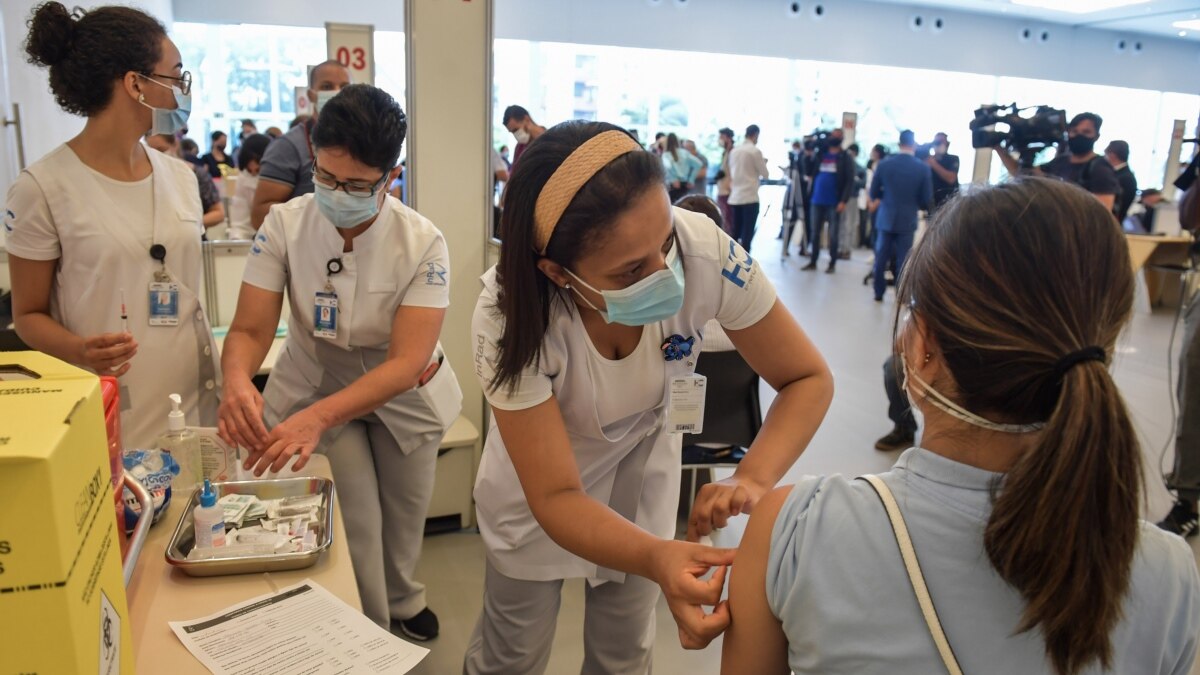World coronavirus cases exceeded 100 million on Wednesday, as countries struggle with new variants of the virus and a limited supply of vaccine.
The countries most affected include the United States, India, Brazil and Europe. More than 2.1 million people died of COVID-19, based on information from the Johns Hopkins University Coronavirus Center.
At the moment, the United States’ Center for Disease Control and Prevention (CDC) says there is no evidence that new variants of the coronavirus cause more serious illness or increase the risk of death.
However, the CDC adds that scientists are still working to understand how easily new forms can spread. They also want to find out whether they can cause more serious illnesses or whether the currently approved vaccines will protect people against them.
It turned out that three of the new variants of the coronavirus came from three countries: Great Britain, South Africa and Brazil.
Great Britain variant B.1.1.7
In Britain, a variant of the coronavirus known as B.1.1.7 was first recognized in September 2020. It spread rapidly in southern Britain, including London. Since then, it has spread to Europe, the United States and Canada.
Health organizations claim that this variant spreads more easily and quickly than others. But there is no evidence that it causes more serious illness or an increased risk of death.
South Africa 501Y.V2 variant
In South Africa, another variant called 501Y.V2 was found in early October. There have been cases caused by this variant in 20 countries, including Australia and Canada, but not in the USA
The variant is also known as B.1.351 and shares some genetic changes similar to that of Great Britain. Scientists are concerned that the antibodies of a small number of people who have recovered from COVID-19 or received a vaccine were less effective against this variant.
Variant P.1 from Brazil
The coronavirus P.1 variant was first identified in four travelers from Brazil who were tested at Haneda airport, outside Tokyo, in January. The variant, however, could have existed much earlier in Brazil and has spread to many countries, including Germany and South Korea. This week, the United States also confirmed its first case of the variant in Minnesota.
The CDC says the first evidence shows that antibodies to a coronavirus or vaccine infection may not be able to recognize the P.1 variant.
What causes the variants?
Like other viruses, the CDC says that SARS-CoV-2, the coronavirus that causes COVID-19, is always changing and has always changed. Sometimes, new variants appear and disappear. Other times, new variants appear and spread to many countries.
Daniel Rhoads is a microbiologist and pathologist at the Cleveland Clinic. He said: “Although this is worrying, it is not really surprising – we have been watching this and more or less waiting for it”.
At the beginning of the pandemic, other variants, including D614G and L452R, appeared. However, the new variants are getting attention now because they seem to spread more easily and quickly, which can lead to more cases of COVID-19. Another concern is whether approved vaccines like those from Pfizer and BioNTech or Moderna could be effective against them.
Caitlin Rivers is an epidemiologist at the Johns Hopkins Center for Health Security. She told the Associated Press: “I am concerned that the variants may be throwing us a curved ball.” This means that the variant can present an unexpected and difficult problem.
The US government’s leading infectious disease expert, Dr. Anthony Fauci, said scientists are studying vaccines to deal with the new variants.
Moderna announced on Monday that it is testing a reinforcement vaccine against the new variants. Pfizer, which makes a vaccine similar to COVID-19, said its study shows that the vaccine is effective against the variant in Britain, but doubts remain about those found in South Africa and Brazil.
American drugmaker Johnson and Johnson plans to report its vaccine study next week. Final stage tests are being carried out in the United States, South Africa and Brazil. Scientists hope the results will show how well it works against the new variants.
What can be done?
The CDC says it is working with other public health agencies to monitor check the situation closely and look for new variants of the COVID-19. It also has employees on site to study and investigate the new variants.
The health agency warns that the increase in public health measures, such as vaccination, physical distance, use of cloth covers and hand washing, will help limit the spread of the new variants.
On Tuesday, the United States announced that it had banned travelers from Europe, Britain, Brazil, Ireland and South Africa. Other countries on the shortlist include China and Iran.
In Europe, Belgium has banned all non-essential travel until March. And France may soon start a third blockade if the 12-hour daily curfew does not slow the spread of new infections.
I’m Mario Ritter Jr. And I’m Jonathan Evans.
Hai Do wrote this report for VOA Learning English. Mario Ritter, Jr. was the editor.
______________________________________________________________
Words in this story
variant –N. something that is different in some small aspects from others of the same type
reinforcement –N. an additional amount of medicine or vaccine that increases resistance to disease
monitor –V. to watch or watch carefully over time for a special purpose
We want to hear from you. Write to us in the comments section, and visit our Facebook page.



